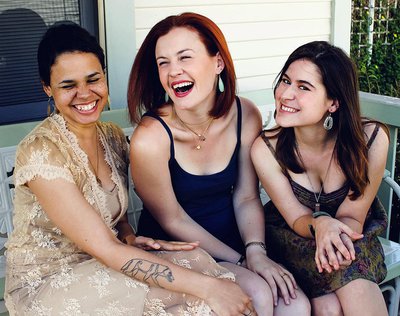
A cappella singing — that is, voices without instruments — is probably the oldest form of music, but today’s a cappella music scene feels fresh, thanks in part to the latest revival that started on college campuses in the 1990s. Although the tradition never really went away (as demonstrated by classical groups like Anonymous 4 and Chanticleer and neo-doo-woppers like The Persuasions, The Bobs and Take 6), these days find a cappella on TV, in the movies (Pitch Perfect) and on more than 1,000 college campuses.
This weekend it’s at The Shedd, when the second annual SheSings Women’s A Cappella Festival returns to showcase vocal vivacity via some of the nation’s finest all-female ensembles. Headline acts include two new groups already setting the pace in women’s a cappella music. The Friday, May 23, concert includes Los Angeles’s The Voxettes (who sing jazz, pop and folk songs plus body beat-boxing), Eugene’s own Synergy (with singers from Oregon Children’s Choir), Utah’s Noteworthy and The Riveters, the California group that debuted at last year’s SheSings. The Riveters are led by a star of the movement, Oregon native Lisa Forkish, who a decade back helped lead the UO’s Divisi to national acclaim. The current Divisi performs Saturday, May 24, along with Southern Oregon’s award-winning barbershop quartet Rogue, Oakland’s national award-winning teenage ensemble Vocal Rush (which Forkish now directs) and California’s acclaimed Honey Whiskey Trio, the jazz-bluegrass-folk-oriented group that won last year’s Harmony Sweepstakes National Competition.
“When I first got involved in a cappella over twelve years ago, there was a very specific collegiate women’s a cappella sound that left a lot to be desired, and the only prominent adult/pro all-female group at the tip of people’s tongues was Sweet Honey in the Rock — a group of women in a class all their own and completely distinct from what we call ‘contemporary a cappella,’” Forkish wrote on her blog last week. “Twelve years later, I DO feel we’ve made some tremendous progress and am proud of how some of the stereotypes surrounding women’s a cappella are being squashed.”
But with male a cappella groups greatly outnumbering their counterparts, women’s a cappella has room to grow. “So many women’s groups are simply trying to sound as much like an all-male or co-ed group as possible, focusing on singing as low and as high as possible, as loud as possible, as full as possible,” Forkish continues. “These are great goals to have, but … we shouldn’t be striving to effectively imitate or ‘catch up’ with the male/co-ed groups, but rather redefine women’s a cappella using our own unique ‘instrumentation’… to its fullest potential.” To help accomplish that goal, SheSings also includes educational workshops, panel discussions and clinics.
Divisi isn’t the only UO group onstage as the academic year draws to a close. Next Friday, May 30, the UO’s spring concert features the University Symphony and Singers performing one of the most beautiful 20th-century classical creations, Ravel’s second suite from his ballet Daphnis and Chloe. The Oregon Wind Ensemble and Oregon Brass Quintet join the fun in other works, including a piece by another UO music alumna, Andrea Reinkemeyer, as well as Oregon native Morten Lauridsen’s famous “O Magnum Mysterium” and more. That afternoon at the UO Jordan Schnitzer Museum of Art, you can hear student chamber music ensembles play music by Prokofiev, contemporary composer Michael Torke and more at a free lunchtime recital. Other UO music and dance ensembles are performing next week as well; visit music.uoregon.edu for details.
Still another erstwhile Eugenean is back in town, although Charles Neville is more famous for his hometown of New Orleans. The Grammy-winning Neville brother plays WOW Hall Friday, May 23, with kora (harp) master Youssoupha Sidibe and their Mystic Rhythms band, lending his restrained, sultry sax lines to Sidibe’s sparkling, reggae-inflected sound.